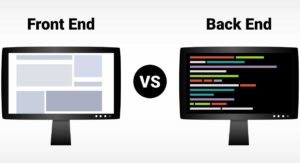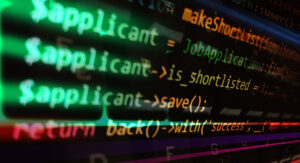For two entities to understand each other and cooperate, they need to share a common language. That’s just common sense. Computers are complex machines that can perform many functions in the blink of an eye. Still, unless it can communicate with the programmers and users, it’s just an over-glorified paperweight. That’s where coding comes in.
This article explains coding and answers the question, “What does a coder do?” We will uncover the mysteries of the coder, how coding differs from programming, the coder’s responsibilities, what kind of skills and programming languages the coder needs, and how you can build a successful coding career as a full stack developer through upskilling.
But before we uncover the secrets of the coding professional, let’s establish a definition.
What is Coding?
People communicate in everyday language, while computers communicate in binary (zeroes and ones). Coding is converting standard human language into instructions that computers can follow. This process is accomplished by employing coding languages, which form the backbone of IT resources such as websites, operating systems, computer software, and mobile applications.
So, coding is the chief way people and computers talk, creating a set of instructions that show the computer what to do.
Now that we’ve established what computer code is let’s look at what a coding job entails, and we will eventually see that it’s more than just writing code.
Also Read: A Guide to Software Engineer Interview Questions
What Do Coders Actually Do?
Coders are sometimes alternately referred to as computer programmers, software developers, or software engineers. Coders create software, the essential building blocks, by changing tasks into instructions and commands for the computer system to execute and process.
Coders use programming languages such as C++, Java, and Python for building software. However, different tasks require different languages. For instance, coders use C++ to develop operating systems but rely on SQL (Structured Query Language) to perform database system scans.
Although coders are often referred to as computer programmers, we’re about to see that asking, “What does a computer programmer do?” isn’t the same as asking, “What does a computer coder do?”
Coding vs. Programming
These two concepts are so closely related that using the terms interchangeably is common. However, coding is a subset of programming. Coding involves writing programs that translate standard language into binary language. At the same time, computer programming is the process of software development, creating a total, end-to-end executable software product, and involves an entire set of tasks, including research, design, testing, implementation, and management.
Check out this table, which compares the two professions side-by-side.
| What Does a Coder Do? | What Does a Computer Programmer Do? | |
| Definition | Coding translates everyday language into binary, which computers understand. | Programming entails developing full-fledged software. |
| Process | Required logic is translated into machine code. | The analysis and conceptualization process covers debugging, compilation, testing, and implementation. |
| Tools used | Text editors like Wordpad, Notepad, and IDEs like Eclipse or Bootstrap. | Analysis tools, assemblers, code generators, databases, data structures, debugging tools, compilers, code editors, testing tools, linkers, GUI designers, and modeling algorithms. |
| Required skills and knowledge | A working knowledge and understanding of various programming languages such as C, Java, C#, etc. | Coding skills, analytical abilities, problem-solving skills, and the ability to write complicated programs, data structures, and techniques. |
| Resulting output | Functional code. | An application, software, or website. |
| Skill level | Coders are essentially developers with a lower level of skill. | Programmers are highly trained IT professionals. |
| Preparation and timeframe | Coders can write code without prep and develop a viable solution in a few hours. However, the process typically involves trial and error. | Programmers take a rigorous and comprehensive approach, and results typically take between a couple of weeks and a few months to achieve. |
| Summary | Coding is a part of programming and involves interpreting requirements, building lines of code, and changing them into machine-readable inputs. | Programming covers the big picture, from assembling and troubleshooting to test execution. Moreover, it fulfills the necessary functionality connecting human inputs to the appropriate machine-level outputs. |
Also Read: Understanding Front-end vs. Back-end Development: Career Guide 2024
What Does a Coder Do? A Coder’s Responsibilities
So now that we’ve answered the question, “What does a coder do?”, let’s investigate the coder’s specific responsibilities. These responsibilities can vary depending on the organization’s size and the coder’s skill level. However, most coding responsibilities fall into one or more of the following stages of the software development lifecycle (SDLC).
- Planning, Analysis, and Design Phases. Creating software and coding projects begin with a plan. Coders figure out who the target users are and what kind of system they’ll benefit from, then create a system design that will function as a plan for the software development.
- Implementation. This is the phase where the coder does the bulk of their work. Here’s where the software gets coded. This stage frequently involves several programmer teams working on different components simultaneously.
- Testing and Development. It’s rare to get things exactly right on the first go. The software gets tested, and coders must be available to implement the fixes. Even after the software gets deployed, the coders may still be called on to eliminate bugs.
- Maintenance. As mentioned in the previous phase, coders must stick around to handle any issues arising after deployment. That spills into this phase but also includes handling any coding tasks with updates and upgrades to the original product.
Now, let’s see which skills coders need most.
What Does a Coder Do? The Most Essential Coding Skills
Good coders possess a diverse range of programming skills. The more skills a coder masters, the more valuable they are in the job market.
Programming
Naturally, coders must know how to program. We will explore programming languages later.
Development Frameworks
Most software companies adhere to particular design standards and procedures, employing selected workflow protocols such as Scrum or Kanban. Coders should know their way around several frameworks, such as:
- AngularJS
- Cordova
- Django
- Hadoop
- Node
- React
Analytical Thinking
Coders must analyze problems, interpret them from different perspectives, consider the resources needed, and combine these aspects to devise the right solution.
Planning
Coders must chart their projects, taking factors such as the time needed, available resources, expected costs, and anticipated risks.
Logic
Programming is a logic-driven activity, and coders must employ reasoning and objective thinking to devise the proper solution.
Communication and Presentation
Coding is usually a team-driven activity, with coders interacting and collaborating with fellow coders, project managers, stakeholders, and customers. This means coders must have good written and verbal communication skills. Additionally, since applications get reviewed multiple times during the SDLC, coders must effectively present their ideas to the clients.
We didn’t touch on formal educational requirements because you don’t need a conventional degree to become a coder. However, a bachelor’s degree in computer science goes far if you want to pursue high-tech fields and aim for the central IT players.
What Popular Programming Languages Do Coders Use Most?
Here are the programming languages used most often by coders. Selecting the correct language for the right job is essential because each language has strengths specific to certain tasks.
- Python. Primarily used for applications in Artificial Intelligence, Machine Learning, data science, financial operations, and interactive social media sites.
- JavaScript. Used mainly by web developers for website and mobile application development.
- Java. Most Android mobile applications are constructed with Java.
- C#. Typically used for operating systems like Microsoft and Windows.
- C. C is mainly used to program hardware devices such as automobiles.
- C++. This is the best programming language for mathematical simulations. Additionally, most development frameworks rely on C and C++.
- Go. Used by applications that involve high-volume data streaming, such as Google, Netflix, and Uber.
- R. Typically used for statistical software.
- Swift. We find Swift mostly in iOS applications.
- PHP. Used for content-driven websites such as WordPress and Wikipedia.
Also Read: All About the Software Development Life Cycle
How You Can Become a Coder
We already mentioned that you don’t need a degree to become a coder, but how do you become a coder? Online resources such as tutorials and coding bootcamps are your best bet. In the former case, you must be extra disciplined since this method has no structure. On the other hand, taking a formal class or attending a bootcamp online provides you with structure and accountability. Additionally, if you take a certification course, you get the credentials that verify your skills to a potential employer.
Make sure you gain experience in the abovementioned skills, especially coding languages.
Once you get some coding skills, create a portfolio of projects, and apply to entry-level coding jobs. In addition, you could look for an internship, which provides you with work-related experience and training and a network of potential connections.
Incidentally, you need not be satisfied with remaining a coder indefinitely. Here’s a sample of coder career opportunities open to the right candidate.
- App Developer
- Business Intelligence Analyst
- Computer Programmer
- Computer Systems Analyst
- Computer Systems Engineer
- Database Administrator
- Front-end Developer
- Full Stack Developer
- Network System Administrator
- Software Quality Assurance Engineer
- Software Developer
- Web Developer
Would You Like a Career as a Full Stack Developer?
Full stack developers are in high demand because their programming knowledge equips them to tackle software design tasks from the project’s start to its finish, from the back end to the front end. Now that you have a better answer to the question “what does a coder do?” and if this career interests you, consider this full stack web development course.
This nine-month post-graduate full stack web development program will help you master front and back-end software development using hands-on projects while you build your own Git portfolio from scratch. In addition, you will gain proficiency in valuable programming skills and concepts such as DevOps, HTML5, CSS3, JavaScript ES6, and more.
According to the Indeed.com website, full stack developers in the United States make an average of $120,702 annually. The more training you have, the stronger your skillset, and the more likely you will get a quality position as a full stack developer. Check out the bootcamp today and get started on a great new career.
You might also like to read:
What Do Coders Do and What Kind of Coder Salary Can You Expect?
React Developer Tools: A Comprehensive List
What Does a Coder Do? A Beginner’s Guide






